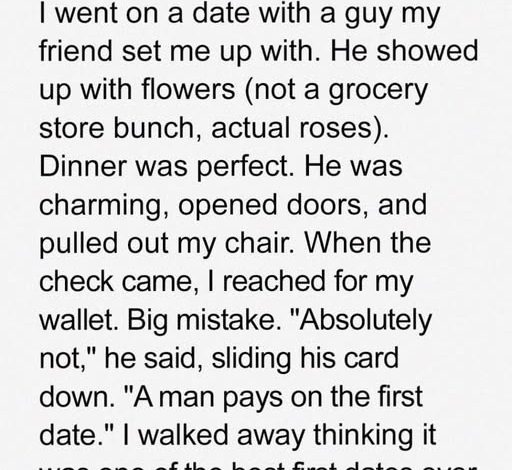My Date Paid for Dinner, Then Everything Took a Turn!

A Hesitant Start to a Seemingly Perfect Evening
When my good friend Mia suggested that I meet one of her boyfriend’s acquaintances, I felt a familiar wave of hesitation. Blind dates have never been something I naturally enjoy. However, Mia was incredibly persuasive, making a strong case for the match. “You’ll love him,” she promised with certainty. “He’s polite, smart, stable — a total gentleman.” Given her enthusiasm and trust in her judgment, I decided to set aside my usual reservations and agree to the meeting.
ADVERTISEMENT
The man’s name was Eric, and our communication started with a week of text messages. His initial messages were impressive. He came across as confident and self-assured, but not in a pushy or arrogant way. He was the kind of person who took the time to write out complete sentences and would engage with my thoughts by asking thoughtful questions instead of simply sending generic, short replies. This engaging online exchange convinced me to finally move forward, and he suggested we have dinner at a very well-regarded Italian restaurant downtown.
ADVERTISEMENT
The start of the actual date was truly picture-perfect. Eric arrived ahead of schedule, which spoke volumes about his respect for time. He held a beautiful bouquet of roses and was dressed in a sharp, crisp button-down shirt. “These are for you,” he announced, offering a smile that, at the time, felt very sincere and practiced, suggesting he valued good manners. Once we were inside the restaurant, he continued to display traditional courtesy: he pulled out my chair, offered a sincere compliment on my dress, and even presented me with a small, personalized keychain that had my initial neatly engraved on the metal.
ADVERTISEMENT
I remember distinctly thinking to myself, Wow, maybe Mia was right. He seemed to genuinely understand the importance of making an effort. During the meal, our conversation was lively and flowed with ease. We covered many interesting topics, including travel plans, professional lives, the universal awkwardness of bad dating app experiences, and our shared feeling of nostalgia for movie theaters that weren’t exorbitantly expensive.
When the waiter placed the bill on the table, I automatically reached for my purse, but Eric immediately stopped me. “A man pays on the first date,” he said with a smooth, decisive action, quickly sliding his credit card over to the waiter. It was an old-fashioned gesture, possibly even a bit of a performance, but I appreciated the clear sign of generosity and did not object.
The pleasant evening continued as we left the restaurant. Eric offered me his arm as we walked to my car, and in another thoughtful move, he waited until he saw me start the engine and drive away before he departed. It felt wonderfully refreshingly normal—there was no uncomfortable pressure or rushed ending, just a genuinely nice and relaxing evening. Feeling quite pleased, I sent Mia a text message on my drive home: You might actually be right about this one.
📧 The Shocking “Invoice” for Affection
The Turn of Events and a Massive Red Flag
The following morning, I woke up with a feeling of genuine optimism. I fully expected to see a sweet, short message from Eric like, “Had a great time.” Instead, I checked my inbox and found an email that instantly caused my good mood to vanish. The subject line was simply: “Invoice for Last Night.”
At first, I was certain it was a simple misunderstanding or a bad attempt at a joke—maybe a funny meme or some sort of playful reference to the expensive dinner bill. However, when I clicked to open the email, the contents made me freeze. It was absolutely not a joke.
The attached document was formatted to look extremely professionally done, complete with a company-style logo, a meticulous table of ‘services,’ and a total amount due section. This was clearly calculated and deliberate.
Every single kind gesture from the night before was listed as a formal charge:
- Dinner: $120, covered in full.
- Flowers: “In-kind gesture — requires reciprocation (one hug).”
- Keychain: “Personalized gift — repayable via coffee date.”
- Emotional labor: “Holding hands next time to express appreciation.”
Then, at the very bottom, written in bold, unsettling text, was the true threat: “Failure to comply may result in Chris hearing about it.”
Chris. That was the name of Mia’s long-term boyfriend. Eric’s friend.
I sat there, staring at the computer screen, completely stunned. My first reaction was utter disbelief. How could someone so charming act this way? My second, stronger feeling was one of disgust. This went far beyond quirky humor. Eric had clearly itemized affection and basic human courtesy as if they were business transactions, and then leveraged a shared social contact—my friend’s boyfriend—to coerce me into seeing him again.
I immediately sent a message to Mia: You’re not going to believe this.
Within minutes, I forwarded the bizarre ‘invoice’ to her. Her reply was instant and definitive: Oh my god. He’s insane. Don’t answer him. Mia, being the fiercely loyal friend she is, didn’t stop there. She shared the shocking email with Chris, who, thankfully, was both mortified by his friend’s behavior and fully willing to mess with his so-called friend. Together, they quickly put together a clever strategy to give Eric a dose of his own medicine.
💥 The Taste of His Own Medicine
A Counter-Invoice and the Final Response
That very afternoon, Chris executed their plan by sending Eric his own official-looking “invoice.” This document was also designed to look official, featuring mock legal terms and a fictional company logo that boldly stated “Karma & Co.”
The list of satirical charges was aimed directly at Eric’s behavior:
- Emotional disturbance fee: For causing significant discomfort to a woman.
- Public embarrassment surcharge: For his failure to act like a mature adult on a first date.
- Service charge: “For sitting at the same table as someone out of your league.”
At the very bottom, in a powerful reversal of the original threat, Chris’s mock invoice read: “Failure to comply will result in permanent reputation damage. No refunds.”
Eric immediately became furious and lost it. He sent me a rapid-fire string of text messages, alternating between outright anger and pathetic self-pity.
“You’re overreacting.” “It was supposed to be funny.” “You just can’t take a joke.”
Then, in a final attempt to salvage his ego, he sent a last message: “You missed out on a great guy.”
I chose not to engage further. I simply replied with a thumbs-up emoji—a quiet, powerful dismissal—and then permanently blocked him.
Later that night, Mia called me, still laughing hysterically from the absurdity of the situation. “I’m so sorry,” she managed to say between gasps. “I swear, I had no idea he was that unhinged.”
I realized I wasn’t even angry anymore. Mostly, I felt an enormous sense of relief. It is truly rare for a person to reveal their deeply flawed character so openly on the very first date.
What Eric believed to be a clever or witty move was actually profoundly creepy. It offered a perfect, early preview of the controlling and entitled behavior he was likely trying to hide beneath his thin layer of fake charm. If that ridiculous “invoice” had never shown up in my inbox, it’s impossible to know how much time it would have taken for me to realize his true nature.
I later reviewed his email one more time, trying to rationally understand his thought process. Was his motive truly about power? Was it purely ego? Or was it just the garden-variety arrogance of an entitled man, poorly disguised as humor? It was probably a combination of all three.
What struck me most was how rehearsed the whole thing felt. The organized layout, the specific wording, the entire fabricated professionalism—this clearly was not a quick, spur-of-the-moment prank. He had almost certainly done this before, or at the very least, had thought about executing this kind of scheme multiple times.
Perhaps he fully expected me to simply laugh it off, or to play along, thereby feeding his desperate need for control, which he mistook for wit. Instead, I did the one thing that truly undermined him: I completely ignored him after my final, simple reply.
In the days that followed, Mia and Chris did the right thing and cut him off completely from their social circle. Apparently, when Chris seriously confronted Eric, he only doubled down on his behavior—claiming that I was “too sensitive” and that “women don’t appreciate humor anymore.” This was a classic, predictable defense mechanism to deflect responsibility.
Meanwhile, my phone remained peacefully and blissfully quiet. There was no more contact from the ‘gentleman’ and no more absurd invoices. Just welcome peace and quiet.
Looking back now, I can almost appreciate the absurdity of the whole ordeal. The evening had started out like a scene from a romantic comedy—all roses, charm, and laughter—but it quickly spiraled into a cautionary, eye-opening tale about the deeper issues of modern dating and a terrible sense of entitlement.
If nothing else, I took away a vital lesson: always pay close attention to the small red flags before they have the chance to grow into massive, life-altering problems. Anyone who views basic courtesy, kindness, or generosity as a debt that is waiting to be collected is not romantic or charming—they are deeply manipulative.
So now, when friends or new acquaintances ask me about my absolute worst dating experience, I don’t even have to pause.
“The one who sent me an invoice,” I say, usually with a big grin.
The story always gets a huge laugh, but I always make sure to add the important punchline: “And he really thought I’d pay.”
The truth is, I did pay a price that night—just not in the way he fully expected. I paid attention. And that valuable awareness is worth far, far more than any dinner bill.




